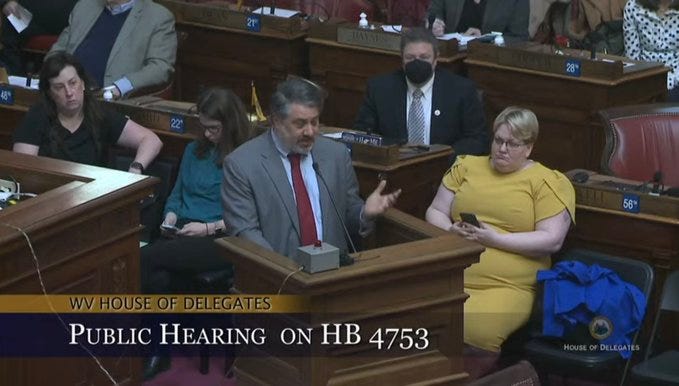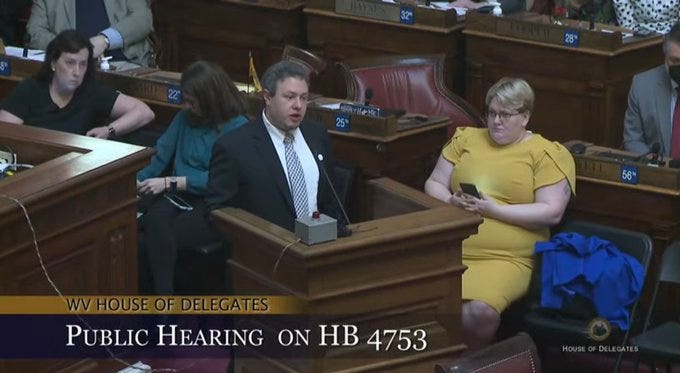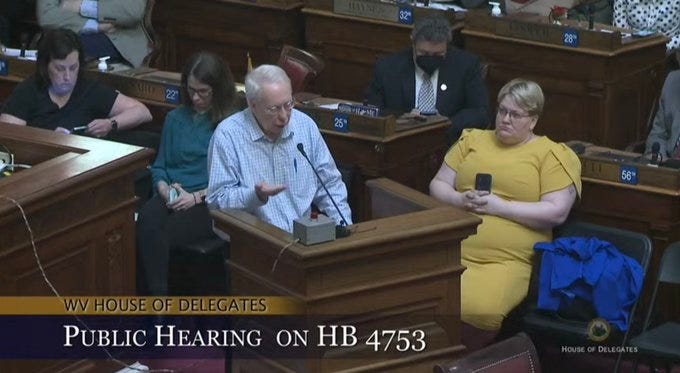Speakers at hearing oppose anti-homeless shelter bill
"The idea that we would take a class of people &, solely based on their economic status, say that they cannot live in certain areas flies in the face of basic American freedoms and ideas of equity..."
By DOUGLAS J HARDING
Fourteen of nineteen speakers at Monday’s public hearing in Charleston said they firmly oppose House Bill 4753, which would ban homeless shelters from operating within 1,000 feet of any schools or childcare centers in the city.
The primary text of the bill states:
“The Legislature finds that unregulated establishment of homeless encampments in areas located near where children congregate and attend school creates a public health and safety hazard, therefore, the siting or establishment of a homeless encampment which includes, but not limited to, outdoor encampments, temporary small homes on-site, tiny homes sheltering homeless persons, or care or feeding areas for homeless persons, within one thousand five hundred feet of a public or private school, or licensed child care center is prohibited.”
The bill, whose lead sponsor is House Minority Leader Doug Skaff, Democrat of Kanawha County, recently passed House Judiciary Committee and will soon be presented to the full chamber.
Tiffany McMillan said she used to be homeless, and she opposes HB 4753 because governments should be focused on helping people experiencing homelessness rather than making their lives even more difficult.
“They should provide more resources for homeless people. We need to get together, as West Virginians, and make more facilities, especially for couples with children and single parents [experiencing homelessness] so their kids can get a good education and they won’t have to live that way anymore,” McMillan said. “This bill will hurt a lot of people, and it will separate a lot of families.”
An additional impact of the bill, McMillan said, would be to further increase the taxpayer burden of paying for more people to be thrown into jails rather than simply providing to them the resources they need.
“Jails are already overcrowded,” McMillan said. “This bill will just add more hardship onto the taxpayers to have to pay for people to be in these jails. Instead of picking up these people and taking them to jail, pick them up and take them to a facility where they can get help, where they can get knowledge, where they can get the resources they need to get back on their feet.”
McMillan also said lawmakers are failing to consider the reasons a person experiencing homelessness might want to sleep or to seek shelter near a school or childcare center.
“Some people stay near schools. Some people sleep near schools,” she said. “I slept near schools because it was safe for me. Other places I could sleep at, I could get robbed or raped or anything. Being near a school is a safe haven for some of these people, but also it gets them close so they can get their kids in school so truancy won’t come pick them up, which will separate [the family]. People aren’t taking that into consideration: Being near a school is so they can get their kids to school and they don’t have to live like that anymore.”
Reverend Kay Albright is a pastor at Bridges of Grace United Church of Christ in Charleston and a health equity outreach coordinator at Covenant House, which offers various services and programs for local people in need. Rev. Albright implored lawmakers to imagine the experience of being homeless in the city.
“Imagine if you will: Being homeless with nowhere to go. You haven’t showered in days. After all, we’re all just a paycheck or two away from this predicament. You are not the problem. You are just trying to find a place to rest, yet everyone harasses you for being homeless and looking and smelling like a bum,” Rev. Albright said. “This is what this bill will do: stigmatize the homeless and understate the complexity of homelessness.”
Rev. Albright said the homeless population in West Virginia is comprised of a lot of people in varying situations, and all such people deserve help rather than further stigmatization and de-humanization.
“The homeless in our state cover a wide range of individuals in different circumstances, including veterans, persons escaping domestic violence, the daughter or son caught in the web of addiction, the mentally ill, and the person who loses their housing for economic reasons or natural disaster,” Rev. Albright said. “The one thing all persons who are homeless have in common is that they are our brothers and sisters.”
Charleston City Councilman Emmett Pepper, who noted he is the father of a 4-year-old child who attends preschool and daycare in the city, said the primary objective of HB 4753 is to make clear lawmakers’ opposition to a single proposed day shelter on the West Side.
“I’m opposed to this bill because it does not fit the issue it purports to address,” Councilman Pepper said. “There have been public meetings about the project this bill seeks to oppose. There were a lot of questions asked about procedures in place for keeping kids safe and specific details about security and other things. This bill doesn’t consider any of that. The only thing considered is distance.”
Councilman Pepper said the bill also fails to consider the fact that there are many children and students in Charleston currently experiencing homelessness.
“[The bill] doesn’t consider if there are children attending that school who need housing nearby,” he said. “I mapped out the flats of Charleston with circles of 1,000-ft radiuses around schools and childcare centers in the flats. Almost all the West Side flats would be precluded from having facilities and huge chunks of the East End as well.”
A preliminary report released last year by the West Virginia Department of Education found that nearly 10,000 students across West Virginia were experiencing homelessness during the school year. The report indicates that about 750 students in Kanawha County were experiencing homelessness, an increase from 620 students the previous year.
Councilman Pepper said state lawmakers should leave the solving of these issues to local legislators who already are working on a solution.
“This bill is a ham-handed attempt to have the state government substitute an overly-broad rule for reasoned consideration that I and all my colleagues on City Council will be doing,” he said. “It ties the hands of local government to actually find solutions to the complex problems of homelessness.”
Eli Baumwell, advocacy director at the American Civil Liberties Union of West Virginia, said HB 4753 promotes the untrue stereotype that people experiencing homelessness are somehow more violent and dangerous than other people.
“No matter how you dress it up, the premise underlying House Bill 4753 is that unhoused people somehow present an extra threat to children and families. This premise is factually untrue. By a wide margin, children are much more likely to be subject to violence and abuse by people that they know,” Baumwell said. “The premise is stigmatizing. People experiencing homelessness are, by definition, already marginalized. They face stigma, discrimination and numerous other barriers in society. The last thing we should be doing is making that worse.”
Baumwell said the primary purpose of the bill is directly in opposition to fundamental American values. He also said the main idea behind the bill does not even make sense.
“The idea that we would take a class of people and, solely based on their economic status, say that they cannot live in certain areas flies in the face of basic American freedoms and ideas of equity under the law,” Baumwell said. “Perhaps most ironically, by definition, if you provided housing to unhoused people, they would stop being unhoused people. Moreover, if the concern is that people are spending time on or near school areas outdoors, providing housing would actually give alternative spaces where these people could spend their time.”
The five speakers who said they support the bill spoke of encounters they and their children have had with people experiencing homelessness in the city.
Charleston resident John Luoni called HB 4753 a “wise piece of legislation” and said that Charleston does not need “San Francisco-style social engineering.”
Luoni said he knows two people in Charleston who had to go to the hospital after interactions with people experiencing homelessness. He said that he and business owners on the West Side are concerned their property values will go down if homeless shelters are established in the area.
Luoni recommended lawmakers amend the legislation to increase the ban on homeless shelters near schools and childcare centers from 1,000 feet to 2,000 feet.
Luoni also referred to people experiencing homelessness as “vermin, criminally insane, mentally insane and child molesters,” and said shelters will be “magnets for problems,” “needles” and “pestilence.”
“We don’t want that in our community,” Luoni said.
Dr. Danielle Wade is a dentist in the Charleston area and said she also supports HB 4753.
Dr. Wade said she “helps people—especially those in need—for a living” and that she is “the most compassionate person you will ever meet.”
Dr. Wade said she is one of the few dentists in the Charleston area who does not send away Medicare and Medicaid patients from her office. Dr. Wade also said she has children who attend an elementary school in Charleston.
“I am always looking over my shoulder getting out of my car, surveying the area [for people experiencing homelessness],” Dr. Wade said. “I have numerous personal experiences [with people experiencing homelessness], and there is not enough time today to list them all.”
Dr. Wade recalled a situation during which a person experiencing homelessness stood in front of her car as she was picking up her children and other children from school. She said the person yelled at her saying that “Those kids are not your children,” forcing her to put the car in reverse on a one-way street.
“He’s got his hands in his pockets, and I’ve got children in the car screaming and crying, and I think he’s got a gun in his coat,” Dr. Wade said. “This is completely unacceptable.”
Dr. Wade said she does not oppose services that intend to help people experiencing homelessness, she just thinks those services should be farther away from children and schools.
The West Virginia Holler is an affiliate of The Tennessee Holler and is powered, in part, by West Virginia Can’t Wait.
Follow the Holler on Twitter @HollerWV and Instagram @WVHoller. We're on Facebook too! Follow writer Douglas J. Harding @douglasjharding.









